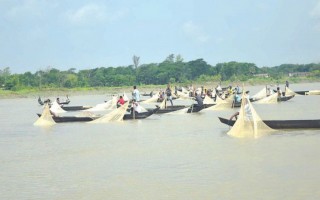Industrial wastes continue to pollute Halda
Industrial wastes continue to pollute the river Halda, the country’s lone breeding ground for natural carp fishes.
Halda researcher, upazila administration, and locals demanded comprehensive measures to stop all kinds of pollution to save the river and its biodiversity.
The Halda originates at the Badnatali Hill Ranges in Ramgarh upazila in the Chattogram Hill Tracts flows through Fatikchari upazila, Hathazari upazila and Raozan upazila and Chadgaon thana of Chattogram city before it falls into the river Karnaphuli.
The 81-kilometre-long river is the only natural carp breeding ground in Bangladesh from where fertilised carp eggs are collected by local fisherman and egg collectors during April to June almost every year.
The collected eggs are hatched in the man-made mud puddles on the riverbank to produce carp fries. The fries from here are supplied to different regions of the country for aquaculture.
Destructions of spawning grounds by oxbow cutting, massive quarry of sands from river bed illegally by a section of unscrupulous traders, pollution of the river by industrial waste, unplanned construction of a good number of sluice gates by the locals for irrigation purpose, indiscriminate catching and killing of the brood fishes and the impact of climate change have posed a serious threat to the biodiversity of the Halda.
Locals alleged that due to these risk factors, the river that was once a haven for brood fishes for releasing their eggs has now become polluted, resulting in a drastic fall in the availability of eggs and fish-fries of natural species as lesser number of brood fishes came here for releasing eggs in the recent years.
Though Hathazari Upazila administration took many initiatives to save the river from all sorts of pollution, industries continued to pollute the river by violating the laws.
On August 11, during Eid vacation, Hathazari upazila administration noticed that Asian Paper Mill, which is situated at Nandir Hat area of Hathazari discharging its liquid wastes to the river Halda. The Morachora canal which is connected to Dom canal, Madari canal and Katakhali canal flows by the mill. Madari canal and Katakhali canal are directly linked to the river Halda. Upazila Administration informed the Department of Environment in Chattogram.
Later on August 18 after a hearing the DoE ordered Asian Paper mill to shut down their operation for polluting the river.
Earlier on May 27, another team of the DoE visited the same point and found evidence of pollution. They had been running the mill without Effluent Treatment Plant and dumping the untreated liquid waste into a pond within the mill premises.
On June 10, considering environmental damage assessment, the DoE fined Tk 20 lakh to the paper mill for polluting the river Halda and ordered them to set up ETP.
On July 18, the DoE find Tk 2.0 million to the Hathazari 100MW Peaking Power Plant for polluting the Halda River by dumping industrial waste. The plant released untreated substance at Morachora canal where just few months back seven railway wagons derailed spilling thousand litres of furnace oil into the water body.
When, as a consequence, a huge number of dead fishes and aquatic mammals were found floating in the river in June 2018, the DoE launched a probe and found Anannya Housing Estate, Abul Khair Consumer Goods, KDS Textile Mills Ltd, Madina Tannery and Hathazari 100MW Peaking Power Plant directly responsible for polluting the river.
Earlier in September 2017, the DoE asked its Chattogram branch to take action against the polluting factories within a month, but nothing happened since.
Hathazari Upazila Nirbahi officer Md Ruhul Amin said that the major challenges of the Halda were — decreasing number of fishes, plying of dredgers and uncontrolled industrial pollution.
He said that they stopped dredgers movement in the river completely and from the first week of September they are going to release one lakh fries in the river Halda to boost brood stock for the first time.
Their only target is to save Halda at any cost as both ecologically and financially it is a very important river of this country.
Ruhul said that among the giant industries Asian Paper Mill and Hathazari Power plant were two main pollutants of Halda. Recently, the DoE shut down the two factories and ordered them to install ETP.
Halda researcher Professor Manzoorul Kibria said that to save the Halda, the industries need to be relocated.
The eminent zoologist said that in the past, the waste released by the factories in Bayezid area used to fall into the Karnaphuli River through the Bamonshahi canal. But things took a turn for the worse in 2009, after the Chittagong Development Authority (CDA) launched a mega housing project, Anannya Residential Area, on the south part of the union.
The CDA already excavated the Bamonsahi canal but they did not yet link it with Karnaphuli River. When it would be linked to the river the waste can fall into the Karnaphuli and at least save the Halda River, said Manzoorul.
DoE assistant director Sangjukta Das Gupta said that after the hearing the DoE shut down the mill and ordered Asian Paper Mills to arrange for proper sludge and waste management system.
She said that it had long been polluting the Halda. Earlier the DoE warned the mill authority several times but they did not pay heed.
In their recent visit, the DoE found that the paper mill kept their sludge in open space which easily flowed down to the Halda through the Morachora canal.
News Courtesy: www.newagebd.net











